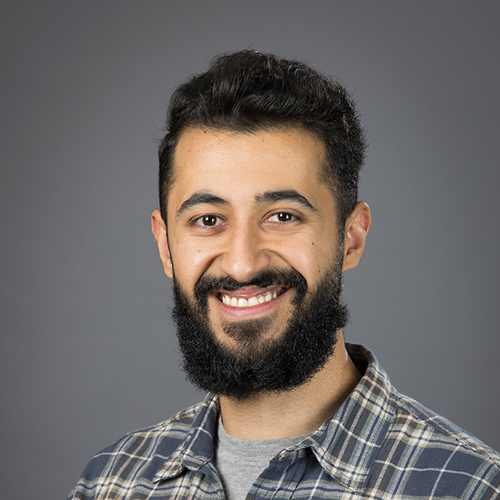
Article
January 10, 2025
Written by Brenda Gillen
Research Explores How Media Can Serve as a Lens for Social Transformation
English master’s student explores themes of surveillance, confinement and racial dynamics in Academy Award-winning film ‘Get Out’
Mohammad Algahtani, a master’s student in the University of Northern Colorado’s English program, explores how media can serve as a lens for social transformation. His research focuses on surveillance, confinement and racial dynamics in Jordan Peele’s 2017 film “Get Out.” The plot centers on a young man in an interracial relationship meeting his girlfriend’s parents for the first time. During a weekend getaway, the main character, Chris, is constantly observed and monitored by the white family and their guests. The comedic horror film earned Peele an Oscar for best original screenplay.
Algahtani first saw the film in the theater. He rewatched it with a critical perspective, analyzing every word, action and scene so many times that he lost count. In studying others’ research, he discovered a gap in scholarly discussions about the film.

“Surveillance was the missing aspect. No one was talking about it,” he said. “The film uses surveillance to reinforce racial power structures and to control and confine Black individuals both physically and psychologically. It mirrors real-life racial profiling and systemic oppression.”
Courses on narrative theory, cultural studies and advanced research methods gave Algahtani the tools for deep analysis, while discussions with professors and peers helped refine his arguments.
“I hope my research can further conversations about how media reflects and critiques societal issues. I envision it being relevant in academic discussions about films, social justice and in broader public conversations about race and power,” Algahtani said.
Associate Professor Molly Desjardins in the College of Humanities and Social Sciences’ Department of English described Algahtani as one of her most enthusiastic master’s students. She said that using the Oxford tutorial method helped him get out of his own head when developing his thesis.
“That entailed us sitting face-to-face after he’d written his work for the week. He’d read it out loud for the first time, getting my feedback and hearing his own research, ideas and writing at the same time,” she said.
Desjardins credited Algahtani’s work with building on two existing scholarly conversations about “Get Out” — how the film uses horror tropes to address racism in post-Obama America and how the film depicts the white gaze.
“Mohammad is bringing these conversations together to focus on the way that the racial dynamics of surveillance in the film reflect the real-life surveillance of Black Americans, which is tied up with the horror of unjust and mass incarceration,” Desjardins said.
She noted that Algahtani approaches the research from a different perspective as an international student who came to UNC from the University of Tabuk in Saudi Arabia. There, he earned a bachelor’s degree in languages and translation and worked as a teaching assistant in literature.
“Where I’m from, there are certainly issues of discrimination and racism. Analyzing this in a different country where it’s ingrained in the system has helped me gain a better understanding of how the world works,” Algahtani said.
He chose UNC because of its strong English program and the opportunity to work with faculty specializing in American modernism, romanticism, rhetoric, composition and media studies, all of which align with his research interests.
“UNC’s English program not only allowed me to pursue my passion for reading and writing, but also grounded me in the knowledge of cultural, literary and rhetorical interpretation and history,” he said. “I have deep gratitude for the support I have received throughout my time here. Dr. Desjardins’ mentorship, her academic and personal guidance, has been invaluable. Department Chair Dr. Cornish encouraged and supported me, which also made a significant impact on my academic journey.”
After getting a doctorate in literature and literary studies, he plans to return to teach in the University of Tabuk’s English program. In the meantime, he continues exploring how literature and media reflect societal issues, cultural dynamics and historical contexts.
“I’m excited to contribute to the important discussions on race, media and society and to carry forward everything I have learned as I continue my academic career,” Algahtani said.



